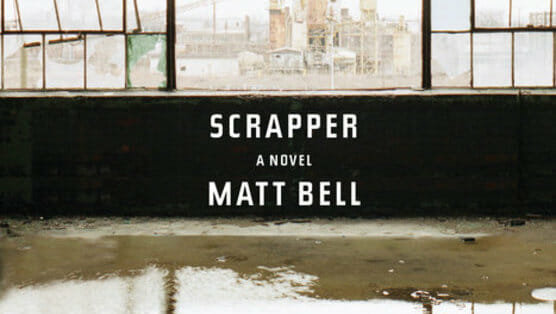Scrapper by Matt Bell

At their most earnest, post-apocalyptic books or films incorporate some element of the speculative, advising their audiences—explicitly or implicitly—that the ruined world they portray represents one possible future. That is, if we don’t reverse the course we’re on. Matt Bell’s new novel Scrapper envisions a world as grim and primed for post mortem as any sci-fi dystopia.
But there’s nothing speculative about the blighted Detroit that Bell describes, a post-industrial wasteland of decay, abandoned neighborhoods and derelict buildings left to the wolves and termed “the zone.” The zone, along with the titular “scrapper,” are real features of current-day Detroit, a city that’s lost millions of jobs and a quarter of its population in this young century. The seed of Bell’s story was planted in 2012 when The New York Times published an article titled “Dismantling Detroit,” which profiled two documentarians and their new short film of the same name depicting “young men who salvage scrap metal from Detroit’s derelict buildings… and risk their lives to squeeze any last dollar out of the industrial detritus.”
 Bell’s scrapper is a former boxer named Kelly who has recently returned to his native Detroit and spent the last year eking out a living on regular late-night scrapping excursions in the zone. Kelly has fled the self-imposed wreckage of a life down South that we see only in glimpses; we know he lived there with a woman and her son—and loved them both—but inflicted some unspecified sexual abuse on the boy that destroyed their lives and exiled Kelly to Detroit. As the novel begins, Kelly becomes involved in a boozy but ever-deepening relationship with a young woman with a bad leg and an encroaching illness that eventually confines her to a wheelchair and renders her unable to speak.
Bell’s scrapper is a former boxer named Kelly who has recently returned to his native Detroit and spent the last year eking out a living on regular late-night scrapping excursions in the zone. Kelly has fled the self-imposed wreckage of a life down South that we see only in glimpses; we know he lived there with a woman and her son—and loved them both—but inflicted some unspecified sexual abuse on the boy that destroyed their lives and exiled Kelly to Detroit. As the novel begins, Kelly becomes involved in a boozy but ever-deepening relationship with a young woman with a bad leg and an encroaching illness that eventually confines her to a wheelchair and renders her unable to speak.
The defining event in the novel occurs one night when Kelly finds a naked kidnapped boy chained to a bed in the basement of a house he’s scrapping. Never far from doing the unforgivable, Kelly shuts the door when he leaves the room to retrieve his tools, and briefly considers alternative courses of action before going back to save the child. He cuts the chain and carries the boy out to his truck, only to return to the house to gather his remaining tools and backpack, leaving the boy shivering and terrified in the “pit” of his pickup truck’s cab. Then Kelly delivers him to the emergency room, “passing through the bright and sterile and indistinguishable light of the hospital, toward the company of others, where they would be safer than they were now, alone.”
What follows is one of the most unflinchingly real and devastatingly disconcerting narratives of a hero’s acclaim imaginable. Like Nixon in dire need of a shave, Kelly looks far more frightening than heroic on camera when he meets the boy’s parents to receive their thanks and claim the reward. Bell brilliantly manages this shared discomfort, convincingly conveying every element of this “stuck in a moment you can’t get out of” encounter, right down to the boy’s flinching when his father tries to touch his shoulder and the parents’ horrified reaction when Kelly tells the boy he’d like to see him again.